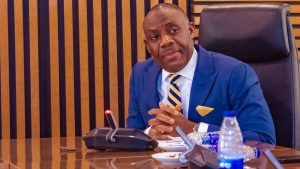
By Amieyeofori Ibim
When the President of the Nigerian Bar Association (NBA), Afam Osigwe, declared that the Supreme Court of Nigeria has become the “worst since the return of democracy,” he did not merely vent personal frustration — he delivered a solemn verdict on the state of the Nigerian judiciary. His words, though harsh, are a mirror reflecting the despair of a nation whose highest court has become a symbol of compromise rather than courage. The judiciary, once the sanctuary of justice, now stands accused of betraying the very ideals it was meant to defend.
At the centre of this crisis lies the controversial State of Emergency declared in Rivers State and the unprecedented six-month suspension of both the Governor and the State House of Assembly. These actions, carried out under dubious constitutional pretexts, have ignited a storm of legal and political outrage. The measure represents not only an assault on the Rivers people but a direct attack on Nigeria’s federal democracy. What makes this tragedy unforgivable is the complicity of silence from the one institution empowered to halt it — the Supreme Court.
The PDP Governors’ Forum, in a rare show of collective defiance, approached the courts to challenge this constitutional travesty. Their argument is rooted in law, not politics: nowhere in the 1999 Constitution (as amended) is the President or National Assembly authorised to suspend a sitting governor or dissolve a state legislature during an emergency. Section 305(1)-(6) empowers the President to declare such emergencies only in extreme situations threatening public order or national security — never to subvert democratic mandates. Similarly, Section 11(4) allows the National Assembly to assume legislative powers in a state only when that state’s legislature is unable to function, and even then, such intervention must preserve rather than extinguish democratic institutions.
By suspending the Rivers Governor and Assembly, the federal government acted far outside constitutional bounds, committing an act of political overreach that offends both the spirit and letter of the law. The PDP governors’ lawsuits were therefore not acts of partisanship but of constitutional defense. Yet the judiciary, instead of rising swiftly to clarify the law, chose the path of calculated inertia. The Supreme Court deliberately delayed hearing the matter until September 18, when the six-month suspension had run its course, rendering the entire controversy “academic.” In truth, this was not judicial restraint; it was judicial surrender.
By letting time do the work of injustice, the Supreme Court allowed executive illegality to mature into constitutional fact. This dereliction of duty is made worse by its consistency. Time and again, the court has shown remarkable energy when asked to legitimise controversial electoral victories but feigned paralysis when called upon to restrain federal impunity. The Rivers crisis is only the latest evidence of a judiciary that moves swiftly to please power but slowly to protect principle.
The echoes of this abdication can be heard in another unresolved legal battle — the Rivers State Value Added Tax (VAT) case. In Attorney-General of Rivers State v. Federal Inland Revenue Service & Anor (2021), the state asserted its constitutional right to collect VAT within its jurisdiction under Items 7 and 8 of the Second Schedule (Part II) of the Constitution, a right initially upheld by the Federal High Court. The case exposed the fragile foundation of Nigeria’s fiscal federalism. Yet, years later, the Supreme Court has failed to deliver a final ruling, effectively freezing the issue in limbo and denying clarity to all thirty-six states.
This judicial timidity is not new. In A.G. Plateau State v. A.G. Federation (2006), the court warned against federal encroachment on state autonomy, affirming that no arm of the federal government may dissolve or suspend state institutions without clear constitutional sanction. Likewise, in Ladoja v. INEC (2007), the court reinstated a governor unlawfully removed from office, declaring that “the mandate of the people cannot be usurped through political expediency.” The principles established in those cases should have guided the court’s response to the Rivers crisis. Instead, it stood motionless while constitutional order was dismantled in plain sight.
Afam Osigwe’s criticism therefore strikes at the heart of a deepening institutional decay. His accusation that the Supreme Court has become a “source of disappointment to greater number of Nigerians” is not reckless; it is factual. The delay in the Rivers case was not an oversight but a symptom of a judiciary that has become timid before power and indifferent to injustice. When the nation’s highest court chooses silence over scrutiny, delay over decision, it betrays the Constitution and alienates the people.
This is not merely about Rivers State. It is about the survival of constitutional democracy in Nigeria. If a sitting governor and an entire state legislature can be suspended under a so-called emergency, with the courts watching idly, then no state is safe. Today it is Rivers; tomorrow it could be any other. When the rule of law bends to the rule of men, democracy ceases to be government by consent and becomes government by coercion.
The role of the judiciary is not to keep peace with the powerful but to keep faith with the Constitution. Every day the Supreme Court delays justice, it deepens national cynicism. Every time it hides behind technicalities to avoid hard truths, it teaches future leaders that impunity pays. The court’s refusal to confront the executive overreach in Rivers State has now joined a growing list of moral and institutional failures — from its handling of disputed elections to its silence over the VAT dispute and its passivity in matters of national urgency.
The NBA President’s outburst, though shocking, may yet serve a redemptive purpose. It is a wake-up call to the bench, to the bar, and to the Nigerian people. The NBA must follow its words with action — demanding accountability from the judiciary, defending the independence of the courts, and restoring faith in the rule of law. Silence, at this stage, is not neutrality; it is collaboration.
Ultimately, history will judge this Supreme Court not by the number of cases it decides but by the justice it delivers — or denies. It will remember whether the justices stood firm for the Constitution or folded under the weight of political pressure. The Rivers State saga and the VAT controversy will be remembered as defining tests of judicial integrity. So far, the verdict is bleak. Yet redemption remains possible if the court finds the courage to reclaim its place as the guardian of Nigeria’s democracy.
Until then, Afam Osigwe’s condemnation stands unchallenged — a painful truth echoing across a wounded republic: this is, indeed, the worst Supreme Court since the return of democracy.
Amieyeofori Ibim is a seasoned Journalist, political analyst and public affairs commentator
ibimdarlinton@gmail.com
08112095925
About The Author








